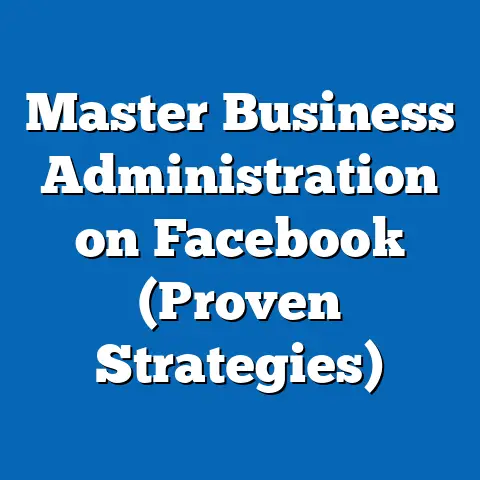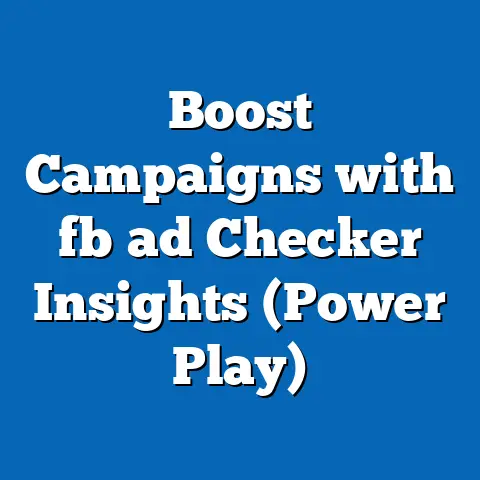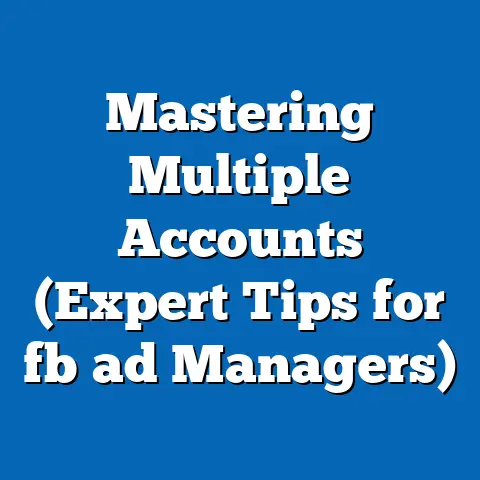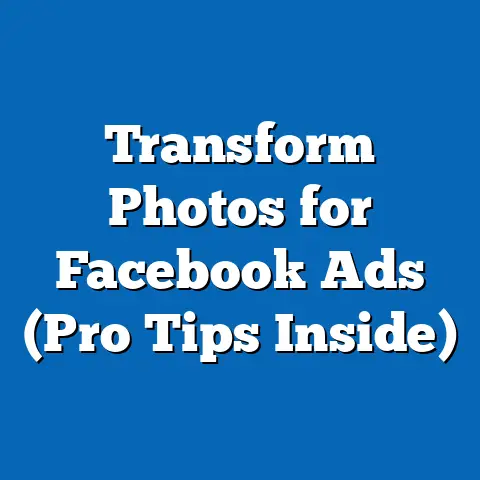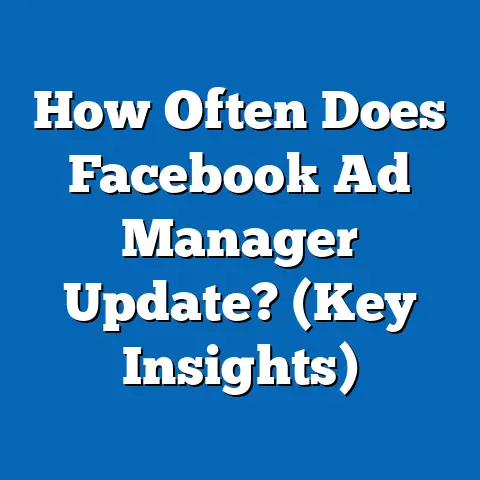Navigating Facebook Ad Agency Contracts (Expert Insights)
Ever heard the story of Faust? He made a deal with the devil, trading his soul for knowledge and worldly pleasures. Sounds extreme, right? But it serves as a cautionary tale about the importance of fully understanding the terms of any agreement, especially when it comes to something as crucial as your Facebook advertising. In today’s digital landscape, Facebook advertising is a powerful tool, but navigating the complexities of ad agency contracts can feel like making your own Faustian bargain if you’re not careful.
I’ve seen countless businesses, from small startups to established enterprises, venture into the world of Facebook ads with high hopes, only to be disappointed by lackluster results and confusing contract terms. I’ve witnessed firsthand the frustration of entrepreneurs who felt trapped in agreements that didn’t deliver the promised ROI. That’s why I created this guide – to empower you with the knowledge and insights you need to navigate Facebook ad agency contracts with confidence and secure a partnership that truly benefits your business.
Understanding the Landscape of Facebook Advertising
Before diving into the nitty-gritty of contracts, let’s first establish a solid understanding of the Facebook advertising ecosystem.
What is Facebook Advertising?
Facebook advertising, now under the Meta umbrella, is a digital marketing strategy that leverages the vast reach and sophisticated targeting capabilities of the Facebook and Instagram platforms to promote products, services, or brands to specific audiences. I consider it to be one of the most potent tools in a marketer’s arsenal.
Unlike traditional advertising, Facebook ads allow you to laser-focus your campaigns based on demographics, interests, behaviors, and even custom audiences built from your existing customer data. This precision targeting leads to higher engagement rates and a better return on your advertising investment.
The Rise of Specialized Facebook Ad Agencies
The complexity of Facebook’s advertising platform has fueled the rise of agencies specializing in Facebook marketing. I’ve noticed over the years that these agencies bring expertise in several key areas:
- Strategic Planning: Developing comprehensive advertising strategies aligned with your business goals.
- Campaign Management: Creating, implementing, and optimizing ad campaigns for maximum impact.
- Creative Development: Designing visually appealing and engaging ad creatives that capture attention.
- Data Analysis: Monitoring campaign performance, analyzing data, and making data-driven adjustments to improve results.
- Staying Up-to-Date: Facebook’s algorithm and ad formats change constantly. Agencies dedicate time to staying on top of these changes.
Hiring an agency can be a game-changer, especially for businesses lacking the in-house expertise or resources to manage their Facebook advertising effectively. However, choosing the right agency and structuring the partnership with a well-defined contract is crucial.
The Importance of Facebook Advertising: Statistics and ROI
Facebook remains a dominant force in the digital advertising landscape. Here are some compelling statistics that highlight its significance:
- User Base: Facebook boasts billions of monthly active users, providing an unparalleled reach for advertisers.
- Ad Revenue: Facebook generates billions in advertising revenue annually, demonstrating the platform’s effectiveness for businesses of all sizes.
- ROI: Studies have shown that Facebook ads can deliver a significant return on investment, with some businesses reporting a return of several dollars for every dollar spent.
These numbers underscore the potential of Facebook advertising to drive business growth. However, achieving a positive ROI requires a strategic approach, effective campaign management, and a clear understanding of your target audience. This is where a skilled ad agency can make a significant difference.
Takeaway: Facebook advertising offers immense potential for businesses to reach their target audience and drive growth. However, partnering with the right ad agency and establishing a clear contract is essential to maximize your ROI.
The Anatomy of a Facebook Ad Agency Contract
Now, let’s delve into the essential components of a Facebook ad agency contract. Understanding these elements is crucial for protecting your interests and ensuring a successful partnership.
Scope of Work: Defining the Services
Here are some key questions to consider when reviewing the Scope of Work:
- What specific tasks will the agency perform? (e.g., campaign setup, ad creative design, audience targeting, A/B testing, reporting)
- Which platforms are included? (e.g., Facebook, Instagram, Audience Network)
- What is the frequency of reporting and communication? (e.g., weekly reports, monthly meetings)
- What level of access will you have to your ad account? (e.g., read-only access, full administrative access)
- Who owns the ad creatives created? (Clarify ownership of the intellectual property)
Example: A vague Scope of Work might state “The agency will manage Facebook advertising campaigns.” A more specific and effective Scope of Work would detail: “The agency will manage Facebook and Instagram advertising campaigns, including keyword research, audience targeting, ad creative design (up to 3 ads per month), A/B testing, daily campaign monitoring, weekly performance reports, and monthly strategy meetings.”
Payment Terms: Understanding Compensation
The Payment Terms section outlines how the agency will be compensated for its services. There are several common compensation models:
- Flat Fee: A fixed monthly fee for a defined set of services.
- Commission-Based: A percentage of your total ad spend.
- Performance-Based: Compensation tied to specific performance metrics, such as cost per acquisition (CPA) or return on ad spend (ROAS).
- Hourly Rate: Payment based on the number of hours worked.
- Hybrid: A combination of different models (e.g., a flat fee plus a commission).
I’ve found that the best model depends on your business goals and the agency’s expertise. A performance-based model can be attractive, but it requires clear and measurable goals. It’s crucial to understand all potential costs, including ad spend, agency fees, and any additional charges for creative development or other services.
Example: A commission-based model might state “The agency will receive 15% of the total monthly ad spend.” A performance-based model might state “The agency will receive a bonus of \$500 for every month that the campaign achieves a ROAS of 3x or higher.”
Duration: Contract Length and Renewal
The Duration section specifies the length of the contract and the terms for renewal. Common contract lengths range from 3 months to 1 year. I suggest starting with a shorter contract period, especially when working with a new agency, to allow for evaluation and adjustments.
Pay close attention to the renewal terms. Does the contract automatically renew unless you provide written notice? What is the notice period required? Understanding these terms will prevent you from being locked into an unfavorable agreement.
Example: “This contract shall be in effect for a period of six months, commencing on [Date]. The contract will automatically renew for successive six-month periods unless either party provides written notice of termination at least 30 days prior to the renewal date.”
Termination Clauses: Exit Strategies
The Termination Clauses section outlines the conditions under which either party can terminate the agreement. This is a critical section to review carefully.
Consider these questions:
- What are the grounds for termination? (e.g., breach of contract, failure to meet performance goals, change in business strategy)
- What is the notice period required for termination?
- What happens to your ad account and data upon termination?
- Are there any penalties for early termination?
I’ve seen some contracts that heavily favored the agency, making it difficult for the client to terminate the agreement even if the agency wasn’t performing. Make sure the termination clauses are fair and equitable to both parties.
Example: “Either party may terminate this agreement upon 30 days written notice if the other party breaches a material term of this agreement. In the event of termination, the agency shall transfer all ad account access and data to the client within 5 business days.”
Confidentiality Agreements: Protecting Your Data
The Confidentiality Agreements section protects your proprietary information. This is especially important if you are sharing sensitive data with the agency, such as customer lists, marketing strategies, or product information.
The agreement should clearly define what constitutes confidential information and outline the agency’s obligations to protect that information.
Example: “The agency agrees to hold all confidential information of the client in strict confidence and not to disclose such information to any third party without the client’s prior written consent. Confidential information shall include, but not be limited to, customer lists, marketing strategies, product information, and financial data.”
Takeaway: A well-defined contract is essential for a successful partnership with a Facebook ad agency. Pay close attention to the Scope of Work, Payment Terms, Duration, Termination Clauses, and Confidentiality Agreements.
Common Pitfalls in Facebook Ad Agency Contracts
Even with a seemingly comprehensive contract, there are potential pitfalls that businesses can fall into. I want to help you avoid these costly mistakes.
Vague Language and Ambiguous Terms
One of the most common pitfalls is the use of vague language and ambiguous terms. I’ve seen contracts that use phrases like “best efforts” or “reasonable results” without clearly defining what those terms mean.
This lack of specificity can lead to misunderstandings and disputes down the road. Always insist on clear and measurable definitions for all key terms.
Example: Instead of “The agency will use its best efforts to improve campaign performance,” use “The agency will conduct A/B testing on at least 2 ad creatives per week to improve click-through rates by at least 10% per month.”
Ignoring Performance Metrics and Accountability
Another common mistake is failing to include specific performance metrics and accountability measures in the contract. Without clear goals and metrics, it’s difficult to evaluate the agency’s performance and hold them accountable for results.
Define key performance indicators (KPIs) such as cost per click (CPC), cost per acquisition (CPA), return on ad spend (ROAS), and conversion rate. Set realistic targets for these metrics and include clauses that outline the consequences of failing to meet those targets.
Example: “The agency is expected to achieve a ROAS of at least 3x within the first 3 months of the campaign. If the ROAS falls below 3x for two consecutive months, the client has the right to terminate the contract without penalty.”
Overlooking Hidden Fees and Additional Costs
Many businesses are surprised by hidden fees and additional costs that were not clearly disclosed in the contract. I’ve seen instances where agencies charged extra for creative development, reporting, or even account management.
Make sure the contract clearly outlines all potential costs, including ad spend, agency fees, and any additional charges. Ask for a detailed breakdown of all costs before signing the agreement.
Example: “The agency fee includes all campaign management services, reporting, and account management. Additional creative development will be billed at an hourly rate of \$100, with prior client approval.”
Failing to Include Exit Strategies
Failing to include clear exit strategies or conditions for contract termination can be a costly mistake. I’ve seen businesses trapped in unfavorable agreements with agencies that were not delivering results.
Make sure the contract includes fair and equitable termination clauses that allow you to exit the agreement if the agency is not meeting your expectations.
Example: “The client may terminate this agreement upon 30 days written notice if the agency fails to achieve a ROAS of at least 3x for two consecutive months.”
Takeaway: Avoid common pitfalls by using clear language, defining performance metrics, clarifying all potential costs, and including fair exit strategies in your Facebook ad agency contract.
Expert Insights on Negotiating Contracts
Negotiating a Facebook ad agency contract can feel daunting, but it’s an essential step in ensuring a successful partnership. I’ve gathered insights from industry experts to help you navigate this process with confidence.
Tips on Negotiating Favorable Terms
“Don’t be afraid to negotiate,” says Sarah Jones, a digital marketing consultant with over 10 years of experience. “Most agencies are willing to negotiate on price, scope of work, and other terms. The key is to know your budget, understand your goals, and be prepared to walk away if the agency is not willing to meet your needs.”
Here are some specific tips for negotiating favorable terms:
- Do your research: Research the agency’s reputation, past performance, and client testimonials.
- Get multiple quotes: Compare quotes from different agencies to get a sense of the market rate.
- Be clear about your budget: Let the agency know your budget upfront and ask them to tailor their proposal to fit your needs.
- Negotiate the payment terms: Consider negotiating a performance-based payment model or a lower commission rate.
- Negotiate the scope of work: Make sure the scope of work includes all the services you need, but don’t pay for services you don’t need.
- Negotiate the termination clauses: Make sure the termination clauses are fair and equitable to both parties.
The Importance of Transparency and Communication
“Transparency and communication are essential for a successful partnership with a Facebook ad agency,” says David Lee, the CEO of a leading digital marketing agency. “Make sure the agency is transparent about their processes, strategies, and results. Ask for regular reports and schedule regular meetings to discuss campaign performance and address any concerns.”
Here are some tips for fostering transparency and communication:
- Establish clear communication channels: Define how you will communicate with the agency (e.g., email, phone, video conferencing).
- Schedule regular meetings: Schedule weekly or bi-weekly meetings to discuss campaign performance and address any concerns.
- Ask for detailed reports: Ask for regular reports that include key performance indicators (KPIs) and a clear explanation of the results.
- Be open and honest about your goals and expectations: Let the agency know what you are hoping to achieve with your Facebook advertising campaigns.
- Provide feedback regularly: Provide feedback to the agency on their performance and suggest areas for improvement.
Gauging Agency Credibility and Past Performance
“Before signing a contract with a Facebook ad agency, it’s important to gauge their credibility and past performance,” says Emily Carter, a marketing professor at a leading university. “Ask for case studies, client testimonials, and references. Check their online reviews and see if they have any awards or certifications.”
Here are some specific ways to gauge agency credibility and past performance:
- Ask for case studies: Case studies provide concrete examples of the agency’s success with other clients.
- Ask for client testimonials: Client testimonials provide firsthand accounts of the agency’s performance and service.
- Ask for references: Contact the agency’s references and ask them about their experience working with the agency.
- Check online reviews: Check online reviews on sites like Google, Yelp, and Facebook to see what other clients are saying about the agency.
- Look for awards and certifications: Awards and certifications demonstrate the agency’s expertise and commitment to excellence.
Takeaway: Negotiate favorable terms, foster transparency and communication, and gauge agency credibility and past performance before signing a Facebook ad agency contract.
Real-World Case Studies
To further illustrate the importance of a well-structured contract, let’s examine some real-world case studies.
Case Study 1: The E-Commerce Startup
Scenario: An e-commerce startup selling handmade jewelry hired a Facebook ad agency to increase online sales. The initial contract was vague, with no specific performance metrics or termination clauses.
What Went Wrong: The agency ran generic ad campaigns that failed to resonate with the target audience. The startup saw little improvement in sales and struggled to communicate their concerns to the agency. Because the contract lacked clear performance metrics and termination clauses, the startup was stuck in the agreement for six months, wasting valuable time and resources.
Lessons Learned: This case highlights the importance of defining specific performance metrics and including fair termination clauses in the contract. The startup should have insisted on a clear understanding of the agency’s strategy and a mechanism for holding them accountable for results.
Case Study 2: The Service-Based Business
Scenario: A local plumbing company hired a Facebook ad agency to generate leads. The contract included a performance-based payment model, with the agency receiving a bonus for every lead generated.
What Went Right: The agency developed highly targeted ad campaigns that generated a significant number of leads. The plumbing company saw a substantial increase in business and was happy to pay the agency the agreed-upon bonus. The contract clearly defined what constituted a “lead” and how it would be tracked, ensuring transparency and accountability.
Lessons Learned: This case demonstrates the effectiveness of a performance-based payment model when combined with clear definitions and accurate tracking. The plumbing company and the agency had a shared understanding of the goals and metrics, leading to a successful partnership.
Case Study 3: The Established Enterprise
Scenario: An established enterprise with a large marketing budget hired a well-known Facebook ad agency. The contract was comprehensive and included detailed performance metrics, reporting requirements, and termination clauses.
What Went Wrong: Despite the comprehensive contract, the enterprise failed to actively monitor the agency’s performance. The agency became complacent and stopped optimizing the campaigns, leading to a decline in results. By the time the enterprise realized the problem, they had wasted a significant amount of money.
Lessons Learned: This case highlights the importance of active monitoring and communication, even with a comprehensive contract. The enterprise should have established a system for tracking key performance indicators (KPIs) and regularly reviewing the agency’s performance.
Takeaway: Real-world case studies demonstrate the importance of a well-structured contract, clear communication, and active monitoring in ensuring a successful partnership with a Facebook ad agency.
Legal Considerations and Best Practices
Contracts can be legally binding documents, so it’s essential to be aware of the legal aspects when dealing with Facebook ad agency contracts.
The Importance of Consulting Legal Professionals
“I always recommend that businesses consult with a legal professional before signing any contract, especially a complex agreement like a Facebook ad agency contract,” advises John Smith, a business lawyer specializing in digital marketing. “A lawyer can review the contract, identify potential risks, and advise you on how to protect your interests.”
A lawyer can help you understand the legal implications of the contract and ensure that it is fair and enforceable. They can also help you negotiate favorable terms and protect your rights in the event of a dispute.
Best Practices for Reviewing and Signing Contracts
Here are some best practices for reviewing and signing Facebook ad agency contracts:
- Read the entire contract carefully: Don’t just skim the contract or rely on the agency’s explanation. Read every word and make sure you understand the terms.
- Ask questions: If you don’t understand something, ask the agency to explain it in plain language.
- Negotiate: Don’t be afraid to negotiate on price, scope of work, and other terms.
- Get it in writing: Make sure all agreements are in writing and included in the contract.
- Consult with a lawyer: Have a lawyer review the contract before you sign it.
- Keep a copy: Keep a signed copy of the contract for your records.
Conducting Due Diligence on the Agency
Before signing a contract, it’s important to conduct due diligence on the agency. This means researching the agency’s reputation, past performance, and client testimonials.
Here are some specific steps you can take to conduct due diligence:
- Check online reviews: Check online reviews on sites like Google, Yelp, and Facebook to see what other clients are saying about the agency.
- Ask for case studies: Case studies provide concrete examples of the agency’s success with other clients.
- Ask for client testimonials: Client testimonials provide firsthand accounts of the agency’s performance and service.
- Ask for references: Contact the agency’s references and ask them about their experience working with the agency.
- Verify credentials: Verify that the agency has the necessary licenses and certifications to operate in your jurisdiction.
Ensuring Alignment of Goals and Expectations
A successful partnership with a Facebook ad agency requires alignment of goals and expectations. Before signing a contract, make sure you and the agency are on the same page about what you are hoping to achieve with your Facebook advertising campaigns.
Here are some key questions to discuss with the agency:
- What are your business goals?
- What is your target audience?
- What is your budget?
- What are your key performance indicators (KPIs)?
- What are your expectations for reporting and communication?
Continuous Performance Evaluations and Adjustments
Even with a well-structured contract and clear alignment of goals, it’s important to continuously evaluate the agency’s performance and make adjustments as needed.
Establish a system for tracking key performance indicators (KPIs) and regularly reviewing the agency’s performance. Schedule regular meetings to discuss campaign performance and address any concerns.
Be prepared to make adjustments to the strategy, budget, or scope of work as needed to optimize results.
Takeaway: Consult with a legal professional, conduct due diligence on the agency, ensure alignment of goals and expectations, and continuously evaluate performance and make adjustments.
Future Trends in Facebook Ad Agency Contracts
The digital advertising landscape is constantly evolving, and Facebook ad agency contracts are likely to change in response. Let’s explore some emerging trends that may influence future contracts.
The Shift Towards Performance-Based Compensation Models
I believe there’s a growing trend towards performance-based compensation models. Businesses are increasingly demanding that agencies be held accountable for results and are willing to pay a premium for agencies that can deliver.
Performance-based models align the agency’s incentives with the client’s goals and encourage agencies to focus on driving measurable results.
Increased Demand for Transparency in Ad Performance
Businesses are also demanding greater transparency in ad performance. They want to know exactly how their ad dollars are being spent and what results are being achieved.
Future contracts are likely to include more detailed reporting requirements and greater access to ad account data.
The Impact of AI and Technology
Artificial intelligence (AI) and other technologies are transforming the digital advertising landscape. AI-powered tools can automate campaign management, optimize ad targeting, and personalize ad creatives.
Future contracts may need to address the use of AI and other technologies and how they will impact the agency’s services and performance.
Takeaway: Be aware of emerging trends in Facebook ad agency contracts, such as the shift towards performance-based compensation, increased demand for transparency, and the impact of AI and technology.
Conclusion
Navigating Facebook ad agency contracts can be complex, but it’s an essential step in ensuring a successful partnership and maximizing your return on investment. By understanding the essential components of a contract, avoiding common pitfalls, and negotiating favorable terms, you can protect your interests and forge a relationship that truly benefits your business.
Remember the story of Faust? Don’t make a deal without fully understanding the terms. Be informed, be proactive, and be prepared to walk away if the agency is not willing to meet your needs.
The insights I’ve shared in this guide are designed to empower you with the knowledge and confidence you need to navigate Facebook ad agency contracts with success.
Call to Action
Take the time to review your current contracts or seek professional guidance before entering into new agreements with Facebook ad agencies. Your business deserves a partnership that aligns with your goals and delivers the results you expect.


